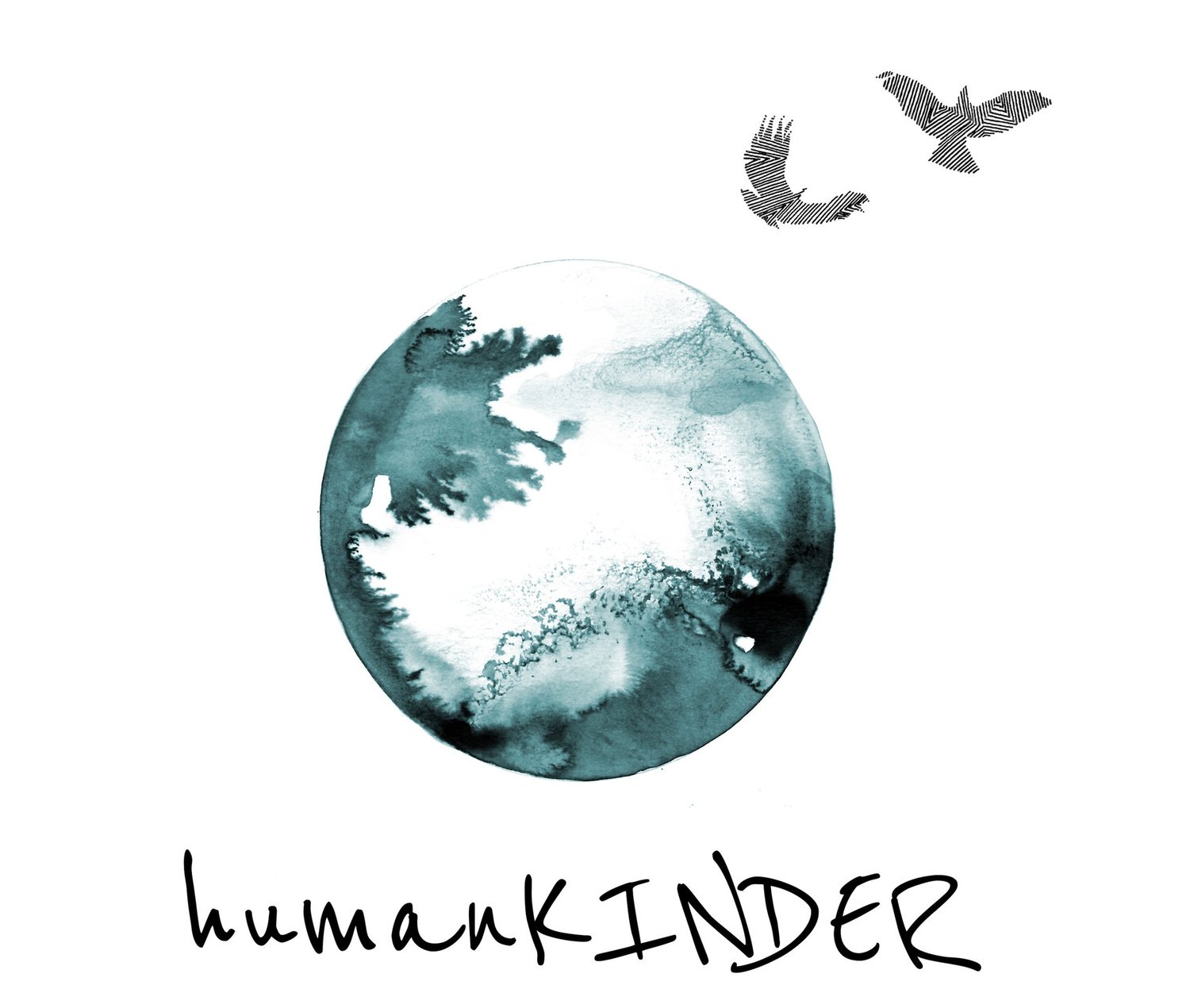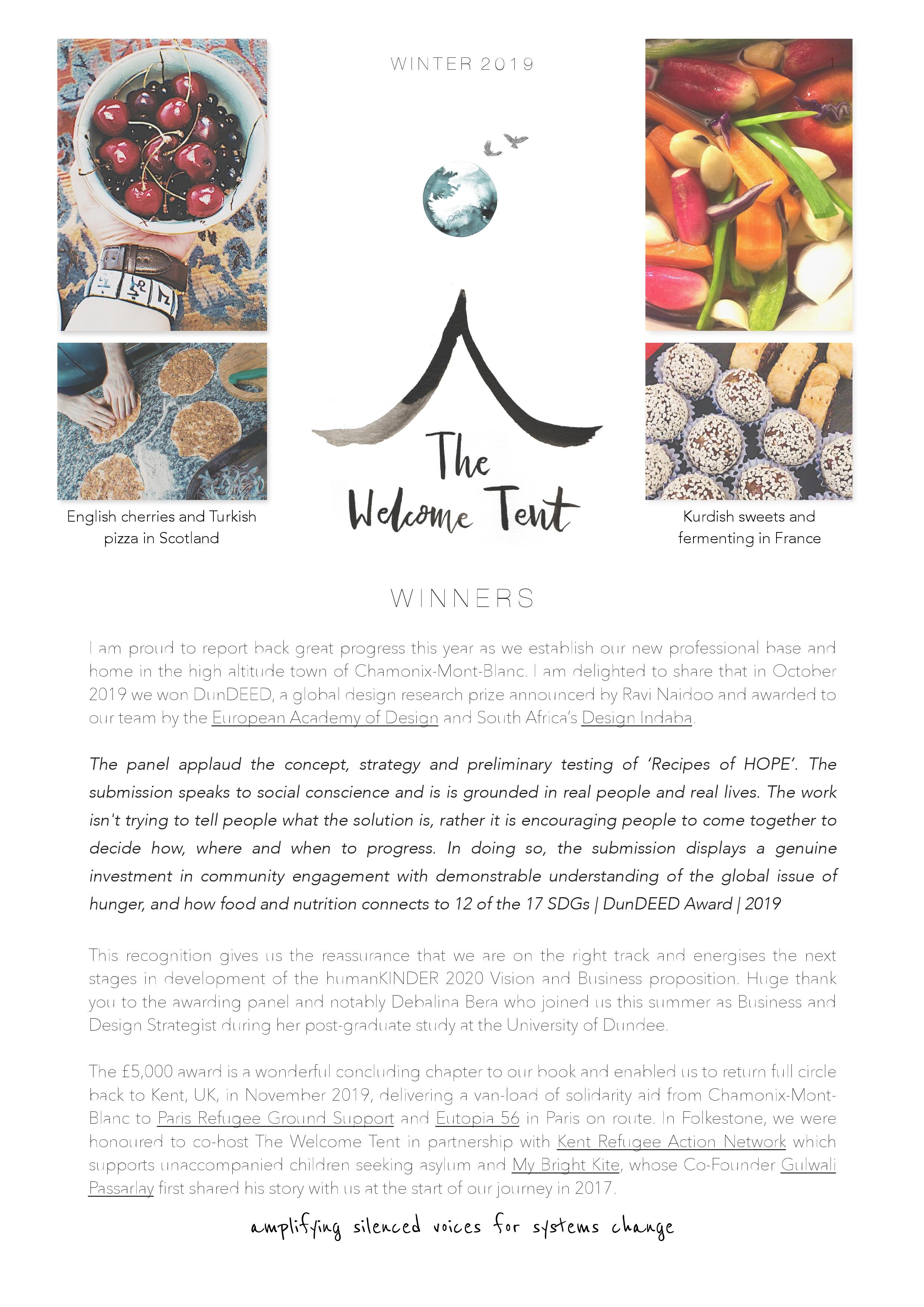New world resilience.
Lockdown Mood. 31st March 2020. Emma Barrett Palmer. Chamonix-Mont-Blanc, France
It is Day 17 - I think - of lockdown in an eerily quiet Chamonix-Mont-Blanc. While my husband caters for the medical teams at the local hospital with Osmose Cuisine, I am using every spare minute of my time and energies to write the Recipes of HOPE Manuscript in between home-schooling. With editorial support from Sophie Okolo, humanKINDER Board Member and Founder of Global Health Aging, this labour of love tells the stories of resilient communities across Europe using the universal language of food. It documents the dishes we shared in The Welcome Tent, a repurposed army catering tent, during my family’s 16,000 mile journey between 2017-18. The book will share recipes which represent over a hundred cultures from around the world and was inspired by the courage of the friends we first met in Calais in 2015.
Many of us have been trying to work differently for years, against the grain of a system that was first designed with exploitation in mind. The potential infrastructure collapse as a result of the current pandemic will not come as a surprise. Many of us had already seen through a window into this future - anticipating - during work and interactions with ignored, displaced and uprooted communities from around the world. A pivotal turning point in my understanding was taking part in Layla F Saad’s Me and White Supremacy Challenge - you can purchase the book here.
When working in government for ten years, I realised that some voices - of the strongest and most resilient people - were being silenced by process and procedure. I believe these are the people we must listen to, learn from and work with: people who have experienced the weight of exploitation, generational trauma or challenging life experiences. Creative participation, grounded in justice and education, is already revealing genuine truths.
“If you take on too much of it, it can collapse you into despair … the other temptation is to go back to denial, minimisation, dismissal...neither of those is a resourceful state. what you want to do is claim the centre: deliberate and decide. Think clearly and then act clearly. Separate your emotions from your deliberations and your decisions… breathe… take the right actions early… first get to higher ground. Secure yourself so that you can be part of the solution so you are not another casualty that needs looking after. ”
As someone who has experience of Post Traumatic Stress Disorder, I know what it is like to live a double life – to be smiling on the outside, but cold with fear on the inside, to start shaking on public transport, to be paralysed with anxiety. As we see events unfold in real life, I predict the whole of society could be traumatised to varying degrees by the current unprecedented challenges we are facing. These turbulent times require us to take ownership of the trauma but focus on the recovery - personally and as a society - consciously training our minds and bodies, nurturing our imagination - escapism to prevent institutionalisation - while holding on dearly to what matters. Living with PTSD made me more vulnerable, but also more receptive. My recovery made me strong: it taught me how to ride the waves.
Recipe testing at home during lockdown. Ghormeh Sabzi. Shared by Nahid at The Welcome Tent at The Angel Microbrewery in Nottingham. UK
I worked for ten years leading the first social innovation lab in UK regional government, coordinating whole system design projects addressing systemic challenges faced by society. To activate a community to solve a problem, a common purpose and language are essential. I found the limiting factors in a government setting were trust and integrity. I have focussed on these two missing ingredients as I have nurtured my own business, humanKINDER Ltd, since 2016. We use food - the language of love, life and survival - as a contextual catalyst for systems innovation, activating community participation in The Welcome Tent. I have found that community recovery needs:
“acknowledgement of systemic pain... equity of representation... needs us to remain hopeful, by sharing what works and being kind to ourselves, each other and nature.”
As super market shelves become empty we must ask the who and the how regarding decisions being made about our existing resources. How can this be done in an ethical way? If there are already fights over toilet paper, what happens when the food runs out? How long can the privilege of purchasing for ourselves as individuals continue: or should we use this pandemic as a reason to transition to local producers, bulk-purchasing where possible from ethical suppliers by community, by tower block, by street, by village? I believe a priority for us all must be to keep asking questions about our civil liberties, freedoms and participation in governance structures, so their erosion does not become our new normal forever.
“we’ve been trained for individualism and it is seriously undermining our resilience ”
It is no coincidence that the people first off the starters’ blocks to back-up the medical front-line, is the humanitarian army of organisers, volunteers and activists that recognise the ‘rabbit in the headlights’ look in themselves and others, but have made action their priority. Have a look at Compassion London, a project set up this week in London and already feeding hundreds of vulnerable children, communities and NHS health workers.
The Recipes of HOPE that I have documented in the forthcoming book will share a wealth of hope and inspiration to build resilient communities all the more suited to navigate our uncertain future. When the time is right and the book is ready - Mont Blanc the highest mountain in Europe will be a natural stage to share - amplifying silenced voices for systems rebuild.
I can be reached at emma@humanKINDER.UK for all enquiries about humanKINDER consultancy, speaking engagements and The Welcome Tent. To contribute towards the production costs of the Recipes of HOPE Manuscript, we are gratefully receiving donations at paypal.me/humanKINDER. Thank you.
Sources
Quotes above are transcribed from the highly recommended Rebel Wisdom’s - Resilience in Time of Crisis.
Happiness All Around Crew. 31st March 2020. Emma Barrett Palmer. Chamonix-Mont-Blanc. France.
No one will be left behind...
In Geneva at the Department of the Director General for a meeting with the Sustainable Development Goals Lab to share humanKINDER’s mission, purpose and aspiration to amplify silenced voices for systems change. The SDG Lab was the brainchild of Director General Micheal Moller in 2016 - who together with the results of a mapping exercise by the International Institute for Sustainable Development - recognised that the organisation needed to move from single focus to look across all issues, finding solutions across systemic horizons. This hybrid innovation lab model sits in the office of the Director General and has all the benefits that come with that, but significantly does not have to adhere to legal protocols which gives it more flexibility.
Peace, United Nations in Geneva, May 2019
Before the SDGs, the UN aspired to the Millennial Development Goals, but with a focus on just “developing countries”: this unsurprisingly caused a divide. The SDGs are now applicable to all countries in the world - an approach which very much resonates with the whole systems approach of humanKINDER. They encompass a framework to address many of the themes emerging during last week’s World Health Assembly - gender, equality, empowerment, communities - which are held precious to us at humanKINDER too.
The SDG Lab regularly hold ‘So What’ sessions which explore a couple of goals and their interrelationship in depth. For example Peace & Development or Gender & Sustainability. A main focus is bridging boundaries and building bridges - sometimes literally - in programmes of work which cut across different departments and areas of work. For example a recent project brought together members of the private financing district on the left bank of Lake Leman in Geneva together with professionals from the UN offices on the right bank. It had been a challenge to bring these two together, notably across the divide of water, but now they have a successful new programme of work which is already seeing new products in the fields of impact investing and blended finance models for good.
The SDG Lab approach very much reminded me of my work in SILK, and notably the challenges of working using design-principles for horizontal human-centred work within the context of siloed teams/organisations/cultures/industries. It was reaffirming to share experiences, limitations and possibilities within this context, sharing the reasons why I felt it important to 'break out' from the institutional setting in order to go TO people rather than expect them to come to us.
For us at humanKINDER it is particularly important to understand what the SDG Lab and the UN mean by ‘inclusion’. We discussed this in depth within the framework of the United Nations 2030 Agenda for Sustainable Development: Transforming our World; notably the pledge from 193 countries to ensure that “no one will be left behind”.
It was and inspiring and intriguing in similar measure inside the Palais des Nations, notably the historical weight of the Council Chamber where the League of Nations had first convened and where the walls were covered with the incredible works of Catalan artist José Maria Sert: studies of War and Peace, Progress of Humanity, Justice and International Law.
Mural by Catalan artist José Maria Sert, League of Nations Council Chamber
full circle,
“Our society has been built on rotten foundations, and if these foundations are left ignored they will fester… As White people we must honour the knowledge and expertise of all communities by a change in our behaviour, through action to decolonise our systems…”
Read more









